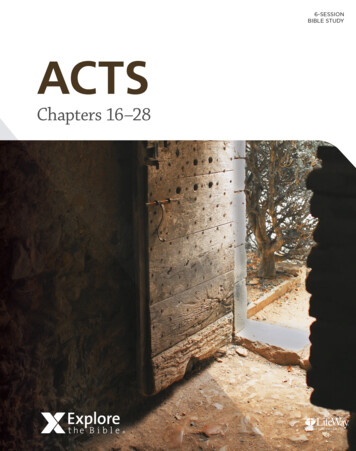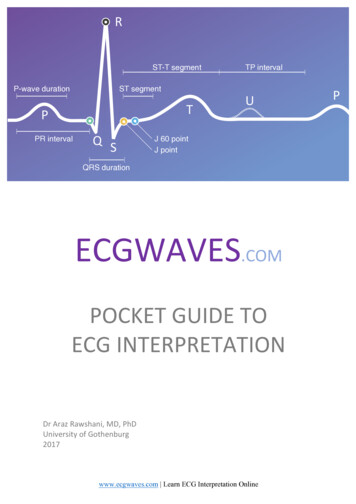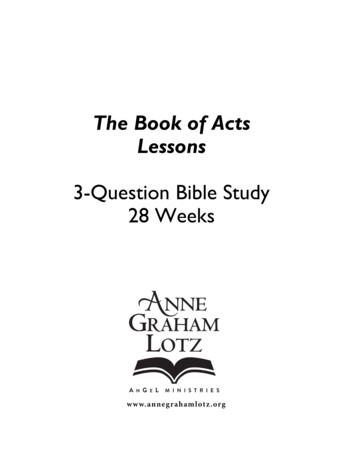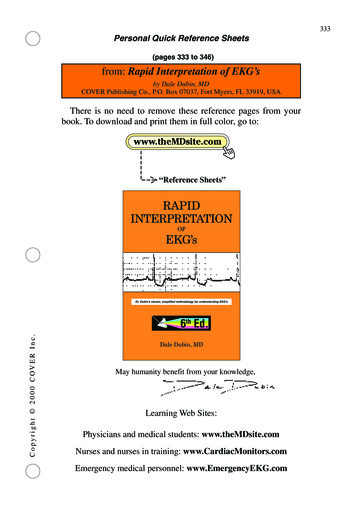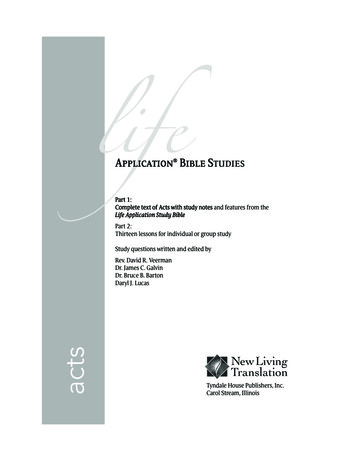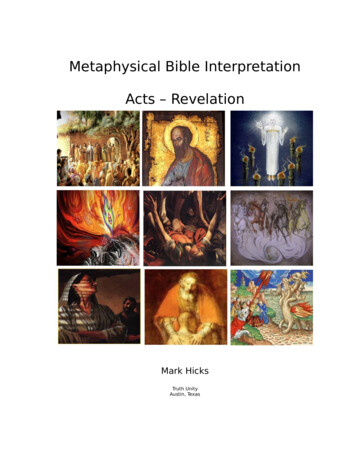
Transcription
Metaphysical Bible InterpretationActs – RevelationMark HicksTruth UnityAustin, Texas
CopyrightMetaphysical Bible Interpretation - Acts toRevelationNovember 2013Copyright 2013 by Mark Hicks under Creative Commons Attribution-ShareAlike 3.0Unported License.You can use and modify this material, even for commercial purposes, as long as whatyou use is attributed to me and you apply the same license to your own work.All biblical quotations, unless otherwise noted, are from the New Revised StandardVersion (NRSV) of the Bible, copyright 1989, Division of Christian Education of theNational Council of the Churches of Christ in the United States of America. Used bypermission. All rights reserved.Truth contact the author at:mark@truthunity.netii
ContentsIntroduction and Acknowledgementsv1 Overview: The Period of Peter, of Paul and of John12 The Metaphysical Peter33 The Metaphysical Stephen54 Acts of the Apostles – Chapters 1 to 1275 Exercise #1: Using The Metaphysical Bible Dictionary116 The Metaphysical Paul137 Acts of the Apostles – Chapters 13 to 28178 Exercise #2: Interpreting Paul's Conversion219 The Authentic Letters of Paul2510 Divine Ideas in Paul's Writings3311 Exercise #3: Interpreting Pauline Verses3912 After Paul: Christianity in the Balance4113 Six Letters Attributed to Paul4514 The Letter to the Hebrews4715 The Letter of James and the First Letter of Peter4916 Letters Against False Teachings5117 Exercise #4: Maieutically Interpreting Col. 1:25-275518 The Revelation to John5719 Exercise #5: Interpreting with New Thought Principles63Bibliography65Appendix – What is Metaphysical Bible Study?67Appendix – Interpreting the Bible Metaphysically71Appendix – Course Description75Alphabetical Index77iii
iv Metaphysical Bible Interpretation - Acts to Revelation
Introduction and AcknowledgementsThree things provide the foundation for a metaphysical understanding of the books ofActs to Revelation in the New Testament: A consciousness of being grounded in Truth, or God-Mind, not in the Bible. Asexplained in the next paragraph, “We are grounded in Truth, not the Bible.” An openness to the Divine ideas that will surely fow into consciousness once weestablish ourselves in Truth study. See the Appendix section entitled “What isMetaphysical Bible Study?” A commitment to explore Acts to Revelation with enough focus so that eChapterOne,“Overview: The Period of Peter, of Paul and of John.”We are grounded in Truth, not the Bible. We are are not bible students, rather wewho do metaphysical bible interpretation are Truth students. Truth students look toperceive, by direct perception with God-Mind, the Divine Ideas that are beingexpressed in all things, all people and all events. In short, we fnd Truth all about us.While we look to the Bible to point to Truth as we look at a painting to point to thatwhich is painted, we do not mistake the painting for the that which it depicts.Why this book? The Unity movement is in process of enhancing its great teachingtradition and to improve the scholarship of metaphysical religion. Scholarship is, byv
nature, a dialog in search of truth. It begins with a study or premise and upon thatstudy constructive criticism is made which leads to new understanding. By thatprocess the state of scholarship moves forward. In Unity, we are all scholars. Whilethere are certainly faws to be found in this study, I ofer it as a written and systematicstarting point for a dialog about our metaphysical interpretation of Acts to Revelation.A resource for teachers and students. If you look a the copyright page, you’ll seeit’s released in a way that allows students and teachers to freely copy and reproducethe material for their classes.And I have intentionally printed this on letter sizedpaper to make it easy to photocopy. If you wish to make an ofering to me for thiswork, please buy a copy for 20 by going pretation-acts-revelationIf you wish multiple printed copies for a class or your bookstore, email me for aquantity discount.Acknowledgements. To my teachers of Spiritual Enrichment and Education at UnityInstitute – Paul Hasselbeck, Tom Thorpe, Norma Rosado, Gloria Holt, Jill Andrews,Michael Maday, Joy Wyler, Aliza Bloom, Toni Boehm, Shirley Kennedy, Jane Simmons,John Anderson – you gave me back the Gospel.Thank you. To Donna Lofin, Linda Holmes, Eileen Ramsey, Lois Hootz, Joan Seim,Allison Hornung, Jim Gardner, Craig and Judy Allen, Maggie Slocum, ElizabethThomas, Glenda Fairchild, Donna Pennell, Betty Kent, Margo Green, Rick Busby,Darlene Traylor – friends, students and seekers - who helped me understand that notevery idea is Divine. To Marika, Vanessa and Stephanie, who never cease to love me.Oops.While I have drawn from Unity traditions, scholarly authors and insightfulteachers this book represents my own view how we may metaphysically interpret theBible. Please let me know how this material can be improved.Mark HicksAustin, TexasOctober 2010vi Metaphysical Bible Interpretation - Acts to Revelation
1 Overview: The Period of Peter, of Paul and of JohnIf we take a broad overview of the years after the ministry of Jesus, we are able todetect three distinct “periods,” which, for convenience, I will refer to as the period ofPeter, the period of Paul and the period of John.The Period of PeterThe Period of PaulThe Period of John30-50 CE50-65 CE66-100 CDActs 1-12 and oral traditionsActs 13-28 and thePost-Pauline letters, otherSeven letters of Paulletters, Revelation to JohnFocus on JerusalemFocus on RomeUniversal FaithHopeLoveClass #1Classes #2,3Classes #4,5The Period of Peter. We begin our study of Acts to Revelation looking at the frsttwenty years of the the church after the ministry of Jesus. Our principle source ofinformation for this period is chapters 1-12 of Acts, but we must remember that theseOverview: The Period of Peter, of Paul and of John 1
chapters were written by Luke after 66 CE and that we must read them from theperspective of a church under great stress by Jewish opposition and Romanpersecution. The work and life of the church during this time begins in Jerusalem andgradually spreads to nearby areas throughout Israel and to Syria. This location givesthe sense of a spiritual community that is somewhat insulated from the larger world,not unlike our own consciousness that resides in oneness of God-Mind. The storiesconvey a church that is opening spiritually and coming to understand the signifcanceof the gospel. Peter is the principle character of these stories and we see in him andthese stories the metaphysical development of faith, our most important spiritualfaculty.The period of Paul. If you are reading this book as part of a course, then the secondand third class will focus on the approximate ffteen years during the active ministry ofPaul, as described in Acts 13-28 and in the seven authentic letters of Paul, which werewritten during this period. The church is expanding through Asia and Greece and thestories convey expectancy and hope, which Charles Fillmore defned as “theexpectation of good in the future.” The church is opening to the outer, Gentile worldand is actually contemplating a challenge to the supremacy of Rome. This sense ofhope and ambition shows a church whose consciousness is not fully mature; one thatis still constrained by time and space. Paul is the principle character of this periodand we see in him a growing willingness of intellect to serve Spirit, which is oneaspect of the unrestricted fow of Divine ideas in consciousness.The period of John.In the forth and ffth class our focus shifts to the thirty or soyears after 66-70 CE. We will read and interpret the latter letters attributed to Paul,the various other letters and the Revelation to John.Peter and Paul had beenexecuted, the temple had been destroyed, Christians had been put out of theSynagogue and it was no longer benefcial for Christians to be identifed as Jews in theminds of the powerful Romans. In contrast to the earlier sense of expectancy and hopeof Paul, we see in these writings a sense of “letting go” and “allowing God” to dowhatever is necessary for the full manifestation, or expression, of Christ. Because thenarrative of Acts does not continue into this period, we do not have rich stories like wedo in the frst two periods; but we may say that the principle character of this era isJohn, writer of Revelation, who is metaphysically symbolic of the faculty of Love, which“endures all things.”2 Metaphysical Bible Interpretation - Acts to Revelation
2 The Metaphysical PeterSimon Peter, brother of Andrew, was a fsherman from Bethsaida, a village near LakeTiberias. He was given the name 'Cephas,' which is the Aramaic equivalent of theGreek 'Peter.' After his confession of faith (Mt. 16.13-20) when he professes his beliefthat Jesus is the Christ, he receives the promise 'Thou art Peter, and on this rock will Ibuild my church”, together with the keys of heaven and the power of binding andloosing. But despite his boast that he will never leave Jesus, when Jesus is arrested hedenies knowing him three times. The fact that Peter has the keys to the kingdom ofheaven and that he is full of contradictions is the key to understanding themetaphysical Peter. The following is a summary of the entry for Peter in the MBD:Metaphysical Interpretation. Peter is the spiritual faculty of faith. This disciple'sname, Simon (hearing), signifying his receptivity and ability to discern Truth, waschanged by Jesus to Peter which is the Greek for the word rock. This represents faithin God, strong, unwavering, and enduring. This faith is a necessary foundation for thebuilding up of spiritual consciousness, the church of Christ, in the individual.Why faith is most important. Peter (faith) was one of the frst disciples that Jesuscalled. Faith is one of the frst spiritual faculties to be called into expression by everyThe Metaphysical Peter 3
one who would follow Jesus in the overcoming life That Peter today stands at thegate of heaven is no mere fgure of speech; he has the "keys of the kingdom ofheaven."The Problem with Peter. Peter represents faith in its various stages of development(Matt. 14:27-31) You fnd that your tools in this new feld of labor are your untrainedfaculties. One of the frst of these faculties to be brought under your dominion is Peter,the thinking power You can see readily why this faith-thinker, Peter, is thefoundation; why the faith faculty should be guarded, directed, and trained. His wordsare operative on many planes of consciousness, and he will bind you to conditions ofservitude if you do not guard his acts closely Until faith is thoroughly identifed withthe Christ you will fnd that the Peter faculty in you is a regular weathercock.You are not Peter, you are Jesus. Get clearly into your understanding that you arenot the faith-thinker, Peter. You are Jesus; Peter is one of your twelve powers. Beforethis truth dawns on you, you are a carpenter, a builder in the realm of matter. Peter isa fsherman, one who draws his thoughts from the changeable, unstable sea of sense How necessary it is that you know the important place in your consciousness thatthis faculty, Peter, occupies! You are the free will, the directive ego, Jesus. You have theproblem of life before you--the bringing forth of the Grand Man with His twelvepowers.“By the activity of your thinking.” Your thinking faculty is thefrst to beconsidered. It is the inlet and the outlet of all your ideas. It is always active, zealous,impulsive, but not always wise You must stay very close to Peter--you must alwaysbe certain of his allegiance and love. Test him often. Say to him, "Lovest thou me morethan these?" You want his undivided attention. He is inclined to wander; you say thatyour mind wanders. This is an error. Divine Mind never wanders. The faith-thinker,Peter, wanders;We must teach Peter to concentrate. Teach him to center on true words. It isthrough him that you feed your sheep, your other faculties. Keep him right at his task.He is inquisitive, impulsive and dictatorial, when not frmly directed. When hequestions your dominion and tries to dictate the movements of your other powers, puthim into line with "What is that to thee? follow thou me."4 Metaphysical Bible Interpretation - Acts to Revelation
3 The Metaphysical StephenStephen was the frst Christian martyr. He was one of the seven appointed to servetables in Jerusalem (Acts 6:5) to allow the apostles time to devote themselves tospiritual matters. He went beyond this assignment to preach to perform healings. Hispreaching was so zealous that he was sent to the authorities, where he gave a greatdiscourse about the irrelevance of the Temple and that the Jews had killed Christ. Thisso incensed the public that they took him out and had him stoned apparently withoutformal trial. It is not surprising that Stephen is one of the most popular of the saints.There is something about martyrdom that appeals to our human (not divine) nature.Stephen was enlightened. The word "Stephen" means encircle with a crown, such asa victors wreath. Crowns are worn on the head, and the head is the seat of theintellect. Therefore Acts 6:8 means that the intellect has been enlightened and whogets intellectually a clear understanding of the truth of man. The heavens are openedto him; one who has had this experience can see the possibilities of man, far beyondwhat has been demonstrated.The Metaphysical Stephen 5
But it was zeal without wisdom.In short, Stephen was an enthusiast. He was,what Eric Butterworth called, “over read and under done.” He had great intellect andwas in fact able to perceive spiritual realities.The problem, according to CharlesFillmore, is that what he sees seems so real that his visions become a moving factor inlife and one goes forth preaching them, talking about them as if they had really cometo pass, as if all had been demonstrated. In short, he lives in his head, but has nowisdom in his body. Stated another way, Stephen had zeal without wisdom.Zeal is one of the twelve powers. Located at the base of the brain and representedby Simon the Zealot, zeal provides enthusiasm, intensity and exuberance; our innerurge to progress; it is our motivation to achieve. Without zeal, stagnation, inertia,death would prevail throughout the universe. Zeal, when applied to the expression ofsome divine ideal, is expressed as genius. Although we recognize genius in greatpeople like Mozart and Shakespeare, Charles Fillmore reminds us that we are allcalled to express the same genius of Jesus Christ, who applied zeal to all his faculties.The problem with zeal is that it is indiscriminate; zeal works to drive forward whatevermanifestation it inhabits. Being indiscriminate, zeal must be tempered with wisdomand this is true even for zeal operating at the spiritual phase of mind.Wisdom is another of the twelve powers.Also known as judgment ordiscrimination, wisdom is the faculty by which we appraise, evaluate, and discern inorder to make correct decisions. It is our ability to know what is best for us. Anyonewho has gone of and eaten a pint of ice cream late at night has lost their faculty ofwisdom for the moment.Fifth Unity Principle applies here. The ffth Unity principle says “Knowing andunderstanding the laws of life, also called Truth, are not enough. A person must alsolive the truth that he or she knows.” Putting what we know into practice requires bothzeal and wisdom.Filled with zeal, but without wisdom, Stephen becameargumentative, and this got him killed.When we are also zealous and withoutwisdom, we take on too much, become “too spiritual,” become “over read and underdone.” The spiritual journey is a lifetime journey. Take it easy on yourself.6 Metaphysical Bible Interpretation - Acts to Revelation
4 Acts of the Apostles – Chapters 1 to 12The following are metaphysical interpretations of the frst twelve chapters of The Actsof the Apostles, gleaned from Elizabeth Sand Turner's Be Ye Transformed and theMetaphysical Bible Dictionary.Acts 1:1-14. Rest in the Upper Room (Faith Center) in the City of Peace. Jesus toldthe disciples to stay put in Jerusalem until they were “clothed with power from onhigh.” Unity knows this as “the secret place of the most high” or “the Silence.” Westay “prayed” up to keep a consciousness of our oneness with God, to keep open thechannels of the fow of spirit, and then, eventually, we will begin to express our divinenature.Acts 1:15. Faith leads. “In those days Peter stood up among the believers.” Peterassumed leadership of the group. We have twelve powers and faith,the ability to perceive spiritual realities, is frst and foremost. Wecall out to faith and rely on faith to lead our other powers.Acts 1:16-26. Life force is lifted up. Matthias is chosen to replaceJudas. Judas is one of our twelve powers, our vitalizing life force,Acts of the Apostles – Chapters 1 to 12 7
that which acquires the substance of what we need to live. We must have this lifeforce, but it must be in service to Christ, our higher nature. Matthias (given whollyonto Jehovah) is chosen by lot to replace Judas.Acts 2. Transformation occurs. Pentecost. So far, in he unfolding of this story, Faith(Peter) has been placed in charge and the life force (hasbeen placed in service to hour higher nature sformation comes powerfully. Pentecost is the thirdgreat event in Cosmic Consciousness in the biblical story:the burning bush, the Transfguration of Jesus and, now,the outpouring of the Holy Spirit on the disciples.Acts 3. Expansion of faith and love. Healing of the man lame since birth at theBeautiful Gate.Turner writes, “When faith (Peter) and love (John) are foremost inconsciousness, we understand the life-giving power ofthe inner spiritual man.” Faith and love are two of ourtwelve powers.Faith perceives spiritual realities andlove is our ability to embrace all things without judgmentor resistance.What happens when we are flled withfaith and love?Acts 4. Dealing with doubts.The chief priests (thoughts of formalism) and theSadducees (thoughts of materialism) arrest Peter (faith) and John (love). What doubtsarrest our faculties of faith and love? Peter and John say “we cannot but speak of whatwe have seen and heard.”Acts 5:1-11. Cleansing the mind. Ananias (conscious thought)and Sapphira (unconscious thought) attempt to fnd spiritualdevelopment while holding worldly thoughts.It doesn't work.The spiritual journey begins with another of the twelve apostleThaddeus. In Unity, the principle means of elimination is use ofa denial, which is “the ability to release the energy and powerwe have invested in old, outworn, negative attitudes or incorrect beliefs.”8 Metaphysical Bible Interpretation - Acts to Revelation
Acts 5:12-40. Allow the Spirit to speak! The Apostles stand up to power and win. Theapostles place their spiritual calling ahead of fears and threats.Remember, this story takes place in our consciousness. We arestanding up to internal, negative self-talk.In case you havereasonable doubts, look to Gamaliel. Turner writes, “Gamalielrepresents a thought of fairness in the mind that is willing to giveeach idea a chance to prove itself. If an idea belongs to the mortalplane of consciousness,it will be destroyed as the individualprogresses spiritually; if is a spiritual idea, it cannot bedestroyed.”Acts 6-7. Zeal can cause resistance. The zeal ofStephen (illumined intellect) and his stoning. Turnerwrites, “They do wonderfully efective work in thoseearly stages — but their work is done in the enthusiasmof the intellect The intellect is argumentative andoften brings about friction It is not necessary to be amartyr in the cause of Truth.”Acts 8. Empowered language. “Philip went down to the city ofSamaria and proclaimed the Messiah to them. “ Philip is one ofthe twelve powers. “Philip represents power, which is energy,vigor, might when we are spiritually quickened, our powerfaculty becomes the means by which we speak the Christ word,frst to our own consciousness and then to others.”Acts 9:1-30. The great light of spiritual understanding. The conversion of Saul. Saulrepresents the human will (one of the twelve powers) the conversion of Saul waspreceded by a great light of spiritual understanding (another of the twelve powers) The word Saul typifes the will in its personal dominance. After the discovery thatthere is a wisdom greater than the personal will, the name is changed to Paul, whichmeans little, restrained, lessened, made small when the will is acting in harmonywith divine law, its work is gentle.Acts of the Apostles – Chapters 1 to 12 9
Acts 9:32-35. Strife will paralyze. The healing of Aeneas at Lydda. “Lydda” meansstrife. “Thought is the oversoul of every bodily function. If there is a part of theconsciousness that has not been exercised rightly in harmonious thought, the bodilyorgan of which it is the oversoul will become paralyzed.”Acts 9:36-43. Relax a bit, overwork will kill. The raising of Tabitha from the dead.Tabitha lived in Joppa (beauty), but the consciousness of the city was so mindful offailures and lost opportunities that it squeezed the life force from Tabitha. Joppa needsto chill out.Acts 10-11. Oneness. No one (and no thing) is unclean. There is no separateness. Theconversion of Cornelius. Cornelius represents “that in consciousness which, no longerbound by outer show and formality, truly searchesafter God.” “In this instance the message reveals how to open the way for the light of spiritualfaith, here typifed by his sending for “Peter.” “TheJewish leaders stand for religious thoughts thatare bound by materialism and the forms andceremonies of religion Gentiles symbolizeworldly thoughts There must be a reconciliationbetween our spiritual and worldly thoughts onlyChrist can break down the wall of separation Faith (Peter) has to be convinced thatthere should be no barriers in the mind all thoughts (Jew and Gentile) are unifed inSpirit.”A consciousness of oneness requires humility: “The Roman centurion ‘felldown at his feet Truly I perceive that God shows no partiality.”Acts 12. Equanimity in times of trouble.Persecution by Herod and the killing ofJames, brother of John. “When grounded in faith and sustained by prayer, we are calmand at peace even in dire straits (Oneness) Such a state of consciousness is achannel through which the Lord can move (Flow).”10 Metaphysical Bible Interpretation - Acts to Revelation
5 Exercise #1: Using The Metaphysical Bible DictionaryThe printed Metaphysical Bible Dictionary.To get started with our ownmetaphysical interpretation, we need to get familiar with the Metaphysical BibleDictionary (MBD) and to know its limitations. The 3,000 entries in the MBD aredefnitions that “have been traced back totheir original root ideas” (:4), based on theinterpretation of Charles Fillmore or, with hisapproval, the interpretation of hisstudent,Theodosia DeWitt Schobert (:3). In this entry,and in nearly all entries of the MBD, we seethree things: Definition. Gamaliel is a Hebrew namethat means “led of God” Briefsketch. The person known asGamaliel, in Acts 5:34, was a Pharisee Metaphysical interpretation. Gamalielrepresents an aspect of consciousness“that will give every idea a chance toprove itself.”Exercise #1: Using The Metaphysical Bible Dictionary 11
TruthUnity: The Online Metaphysical Bible Dictionary. An alternative to lookingup the entry in the printed version of the MBD is to use our free, online resource atwww.truthunity.net/texts/asvThe following is the entry tical information, but thatsomeofthetextis“hyperlinked” to other terms,suchasGod,Jewish,law,council, and Jews, spirit, mindand judgment.The hyperlinking is not only toother MBD entries; there is alsohyperlinking to the AmericanStandardwas the Bible used by CharlesFillmore.Note the referenceabove to Acts 5:34. When youclick on it, you web browser willopen to Acts, Chapter 5 in theASB.From there, you will seeother hyperlinked words, suchas council, Pharisee, law, andIsrael.Bynavigatingtoandfromvarious entries in the MBD andthe ASB, you are able to quicklygrasp the metaphysical meaningof the passage.12 Metaphysical Bible Interpretation - Acts to RevelationBible(ASB),which
6 The Metaphysical PaulPaulThe entry for Paul in the Metaphysical Bible Dictionary says his name comes fromLatin and means restrained, constrained; lessened; made small; little. This issurprising, given that he wrote many letters of the New Testament (but not all that areattributed to him) and that he is most responsible for the Christ message reaching theGentile (non-Jewish) world.There are three things we need to know in order tounderstand Paul, both historically (Crossan :x-xiv) and metaphysically (MBD :506-7).These are his mission, his strategy and his vision.Paul's mission for conquering Rome (the will and intellect). Luke, the writer ofActs of the Apostles, makes it appear that Paul's mission was to convert the Jews wholived outside of Israel. This is a distortion made for political expediency at the time thebook was written. We learn from Paul's own letters that his actual mission was to theRoman Gentiles (non-Jews). When Paul declares in Acts 25:11 “I am appealing to theemperor,” he is not just talking about the unjust treatment he has got from the politicalThe Metaphysical Paul 13
system, he truly believes that he can demonstrate to Rome the Truth of the new worldorder that has come into his consciousness. This shows the true missionary zeal ofPaul. When the governor says “You are out of your mind, Paul!” Paul replies “I amspeaking the sober truth” (26:24). Paul, like Jesus before him, questioned the entireworld order as it appeared at that time. Rome was not just a political empire butrather a civilization, which provided people an entire set of beliefs and rules thatestablished what is normal. And, Paul, having become conscious of a new order ofbeing, set out to challenge that civilization. As Jesus had proclaimed that the reign ofGod challenged the normalcy of the Jewish religion as it was being practiced, Paul sochallenged the reign of Caesar.The metaphysical equivalent of challenging Rome is challenging the reign of the willand the intellect (or understanding) in consciousness. The MBD says “the entrance ofPaul and his companions into Europe is symbolical of opening up the word of Truth inparts of consciousness where it has never before been realized (:506).” These newareas of opening are the will and the understanding, two of the Twelve Powers, whichare often experienced in the front forehead. Paul's original name, Saul, comes fromthe central idea that we use our will to attain that which we need.As Romancivilization used will to impose it's rule over conquered people, so do we, inconsciousness, attempt to use our personal will to impose ourselves over things in thephysical world. A central message of Paul is that the will, when it is “acting in harmonywith divine law, is gentle” (MBD :506).This is why the metaphysical Paul isrestrained, constrained; lessened; made small; little.Paul's strategy of missionary journeys (journeys into the depths of the soul). Inthe Acts of the Apostles we learn that Paul embarked on three journey's throughoutpresent day Turkey and Greece to convert the Jews who lived outside of Israel. But weknow that Paul's true focus was on the Gentiles. What he was actually doing, accordingto Crossan and Reed, was convert poaching (:38-40). While it is true that Paul's base ofoperations was the Jewish synagogue, he went there, not to convert Jews, but toconvert Gentiles who had been previously converted to a luke-warm form of Judaism,those who he referred to as “God-worshippers.” Converted Gentiles were low-hangingfruit for two reasons – their familiarity with the Jewish message made it easy for Paulto convey the Christ message and also their resistance to the restrictions of Jewish14 Metaphysical Bible Interpretation - Acts to Revelation
customs (especially circumcision) made it Paul's Christ message more practicallyappealing.The metaphysical understanding of Paul's journeys is explained by Elizabeth SandTurner.spiritually interpreted, Paul's missionary journeys represent the activity of the word of Truthin the mind and heart of the individual even as the mission of Paul was to spread the Christteaching throughout the world of his time, so it is the mission of our awakened consciousnessto redeem our entire being. 'Go into all the world and preach the gospel' is the Christcommand. When our soul is afre with the Christ light, we enthusiastically preach His gospelthroughout our individual world of mind and body (:64).We see a pattern in the journey when we read about these journeys in the Acts of theApostles (chapters 13-20), in Be Ye Transformed (:64-111) and in the entries for eachcity he visited in the Metaphysical Bible Dictionary. Paul's strategy is to convert thatwhich can be converted (God-worshippers) and to avoid that which is closed to theword of Truth (such as Athens and the Jews). Metaphysically, Paul is building faith forthe eventual conversion of the entire soul. This pattern is useful for our own spiritualdevelopment – when we open our soul in areas where we are ready, and, with nonresistance, to allow God to work, and keep in consciousness the truth that althoughwere are not yet perfect expressions of our divine nature, we will one day be fully inharmony with divine law – then we are truly “preaching the Gospel.”
5 Exercise #1: Using The Metaphysical Bible Dictionary 11 6 The Metaphysical Paul 13 7 Acts of the Apostles - Chapters 13 to 28 17 8 Exercise #2: Interpreting Paul's Conversion 21 . 2 Metaphysical Bible Interpretation - Acts to Revelation. 2 The Metaphysical Peter Simon Peter, brother of Andrew, was a fsherman from Bethsaida, a village .
